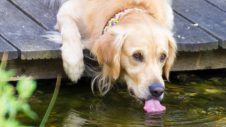What is Giardia?
Giardia is a microscopic protozoan parasite that is infectious to both humans and pets. Giardia have whip-like structures called ‘flagella’ which enable them to move. These parasites live in the intestine where they cause diarrhoea and intestinal upset. Giardia parasites are able to survive for long periods indoors and in the outside environment. Contaminated water digested by your pet is the usual source of infection.
After infection, it takes 5 to 12 days in dogs or 5 to 16 days in cats for Giardia to be found in the stool. Infection is more common in kennel situations where animals are housed in groups.
How is Giardia diagnosed?
Giardia shed organisms intermittently, so they can be difficult to detect in a single examination. Sometimes pets must be retested in order to find an infection. Vets will:
- examine faecal sample with zinc sulphate flotation and direct smears
- perform an ELISA test – a faecal sample is tested immunologically for Giardia proteins
Can it be treated?
A broad spectrum wormer called fenbendazole (Panacur®) given daily for three days then repeated after a week, or metronidazole (Flagyl®) given daily for seven days are common treatments for Giardia. For some resistant cases, both medications are used concurrently. Drontal® may also be used in some cases. Your vet will prescribe the most appropriate treatment for your pet. The ELISA test for Giardia should be negative within two weeks of treatment if the treatment was successful.
Because cysts can stick to the fur of the infected patient and be a source for reinfection, the positive animal should receive a bath at least once in the course of treatment.
Environmental Decontamination
The most readily available disinfectant for your household is bleach diluted 1:32 in water. Never use bleach to wash your pet. Animals should be thoroughly bathed as part of their treatment, before being reintroduced into a clean area in your house. A properly chlorinated swimming pool should not become contaminated, as the Giardia parasite is unable to survive in chlorine.
If you have any further questions or concerns regarding your pet’s health, please contact your local Greencross Vets.

 Greencross Vets
Greencross Vets 





